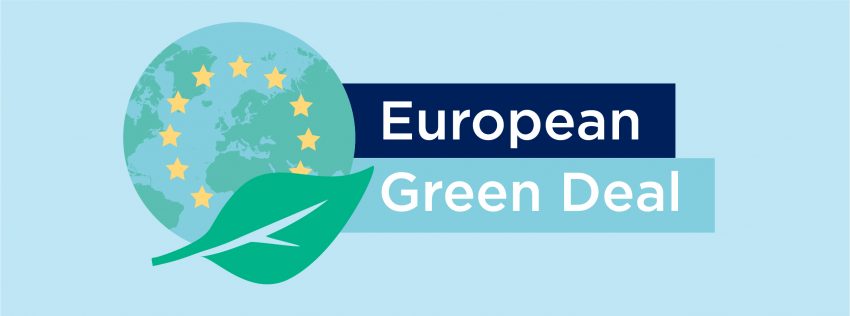A legislative dive into the decarbonization of the European aviation sector
Over the past year, and as never before, sustainable claims from commercial airlines have gained an unprecedented level of media attention in Europe: Lufthansa and Ethiad sustainability ads banned in the UK [1][2], KLM being brought to court by environment action groups for misleading sustainability claims [3], the list could go on. There is growing awareness in the public opinion that flying has a considerable environmental impact and that airlines should not shy away from their responsibilities. Aware of the climate urgency and willing to create a framework where airlines can meaningfully reduce their CO2 emissions, the European Union (EU) came up with an action plan to decarbonize the aviation industry.
What is the European Green Deal?
The European Green Deal, acting as the backbone of the European decarbonization strategy, is a set of legislation aimed at making the European economy Net Zero carbon emissions by 2050. It means that the European industry should emit 90% less in 2050 compared to 1990 [4]. This is particularly ambitious for hard to abate sectors.
In Europe, the transport sector accounts for around 25% of total CO2 emissions [5], 14% of which come from aviation [6]. Considering the drastic efforts needed by the sector to reach Net Zero by 2050, a milestone was set in 2030 where emissions should have been reduced by 55% against a 1990 baseline [7]. This is known as the “Fitfor55”.
To achieve such a target, and as the most mature technology, Sustainable Aviation Fuel (SAF) comes as the pillar of the legislative strategy. According to the report Destination 2050, SAF will account for the largest decarbonization tool to reach Net Zero. Indeed, 35% of the efforts (or CO2 reduction) to reach Net Zero will come from this fuel [8]. Therefore, scaling up the production and the demand for this alternative fuel is critical to achieving EU wide targets. The 4 pieces of legislation presented below have been whether revised or adopted in order to pave the way for Net Zero.
ReFuelEU aviation
In the process of being formally adopted by European Member States [9], and entering into force in January 2025,  RefuelEU Aviation mandates the use of SAF for airlines through fuel suppliers. It means that the fuel suppliers have the obligation to provide airlines with a 2% SAF blend in 2025 and to go all the way to 70% in 2050. As of 2030, the regulation progressively scales up the share of synthetic fuels (also known as e-fuels) to reach 35% in 2050 (half of the blending mandate). The objective being to stimulate the European SAF market and drive investments into the European Union. It is estimated that investments in SAF production plants and SAF purchase will represent 85% of the total investments needed to reach Net Zero in 2050 [10].
RefuelEU Aviation mandates the use of SAF for airlines through fuel suppliers. It means that the fuel suppliers have the obligation to provide airlines with a 2% SAF blend in 2025 and to go all the way to 70% in 2050. As of 2030, the regulation progressively scales up the share of synthetic fuels (also known as e-fuels) to reach 35% in 2050 (half of the blending mandate). The objective being to stimulate the European SAF market and drive investments into the European Union. It is estimated that investments in SAF production plants and SAF purchase will represent 85% of the total investments needed to reach Net Zero in 2050 [10].
European Trading Scheme for aviation
The ETS for aviation, in its first version, was adopted in 2012 and aimed at getting airlines to monitor closely their CO2 emissions and to purchase allowances to compensate them. However, up to now, European Member States have been supporting their carriers by granting them with many free allowances, in other words, free polluting permits. Because of that, the price of polluting was much lower than originally expected. To address this issue, the latest revision of the EU ETS (adopted in December 2022) progressively phases out the free allowances, (as of 2024 and up to 2026). In other words, airlines will now have to purchase much more polluting permits than they previously had to. The additional annual cost for European airlines is estimated to represent around 2,9B€ [11]. Part of the additional revenue aims at rewarding airlines buying SAF by covering part of the premium price between JetA1 and SAF.
supporting their carriers by granting them with many free allowances, in other words, free polluting permits. Because of that, the price of polluting was much lower than originally expected. To address this issue, the latest revision of the EU ETS (adopted in December 2022) progressively phases out the free allowances, (as of 2024 and up to 2026). In other words, airlines will now have to purchase much more polluting permits than they previously had to. The additional annual cost for European airlines is estimated to represent around 2,9B€ [11]. Part of the additional revenue aims at rewarding airlines buying SAF by covering part of the premium price between JetA1 and SAF.
Energy Taxation Directive (ETD)
Exempted from taxes up to now, environmental groups are pushing EU legislators to tax Jet A1. The ETD should  gradually phase out the subsidies on kerosene to mandate a minimum tax on this fuel. In 2033, the minimum tax on kerosene should be of almost 11€ per GJ (representing ~0.4€ per liter) [12]. Going hand-in-hand with the revision of the ETS and RefuelEU, this new tax will incentivize airlines to switch from kerosene to SAF. If we take a broader perspective, on the one hand, both the ETS and the ETD significantly increase the cost of operations for airlines, but on the other hand they do not meaningfully trigger subsidising mechanisms. Hence the importance to drive additional public and private investments.
gradually phase out the subsidies on kerosene to mandate a minimum tax on this fuel. In 2033, the minimum tax on kerosene should be of almost 11€ per GJ (representing ~0.4€ per liter) [12]. Going hand-in-hand with the revision of the ETS and RefuelEU, this new tax will incentivize airlines to switch from kerosene to SAF. If we take a broader perspective, on the one hand, both the ETS and the ETD significantly increase the cost of operations for airlines, but on the other hand they do not meaningfully trigger subsidising mechanisms. Hence the importance to drive additional public and private investments.
Alternative Fuel Infrastructure Regulation (AFIR)
Airports are key facilitators in encouraging airlines to purchase SAF and acquire next generation aircraft. The AFIR, which should be formally adopted in September 2023 [13], aims to steer airports into electrifying their operations. To do so, it mandates the use of Ground Power Units that can provide electricity “from non-fossil origin” to aircraft at both contact and remote stands. This obligation will start in 2025 for contact stands and will be added on in 2030 for all remote stands. As of that date airports should also ensure that the energy supplied to aircraft comes from non-fossil origin. This is seen as a first step towards the further electrification of airport operations. Other legislation, outside of the Fit for 55, such as TEN-T, also go in this direction.
mandates the use of Ground Power Units that can provide electricity “from non-fossil origin” to aircraft at both contact and remote stands. This obligation will start in 2025 for contact stands and will be added on in 2030 for all remote stands. As of that date airports should also ensure that the energy supplied to aircraft comes from non-fossil origin. This is seen as a first step towards the further electrification of airport operations. Other legislation, outside of the Fit for 55, such as TEN-T, also go in this direction.
From theory to practice
The Green Deal and more specifically the “Fitfor55” package sets the European aviation sector on good tracks to reach the Net Zero objective. It does so by creating an all-encompassing approach encouraging airlines to uptake SAF on the one hand and (partly) bridging the gap between SAF and Jet A1 (through taxes and incentives) on the other hand. But most of the efforts still lie ahead. From implementing the legislation to finding business cases and funding opportunities, the decarbonization journey is only beginning.
[9] The text was voted by the European ambassadors in June 2023 and awaits to be formally adopted by the ministers (Q3/Q4 2023).
[13] Already voted at ambassador level, only formal adoption needed at minister level

ABOUT THE AUTHOR
While he has always been passionate by aviation, he studied International Relations and European public affairs. Before joining the company he was working for the European Institutions where he contributed to the elaboration of sustainable aviation legislation. Since he joined To70 Belgium, early this year, he has mostly been involved in sustainability projects and solar panels safety analysis for airports.
Check out our open vacancies around the globe!

